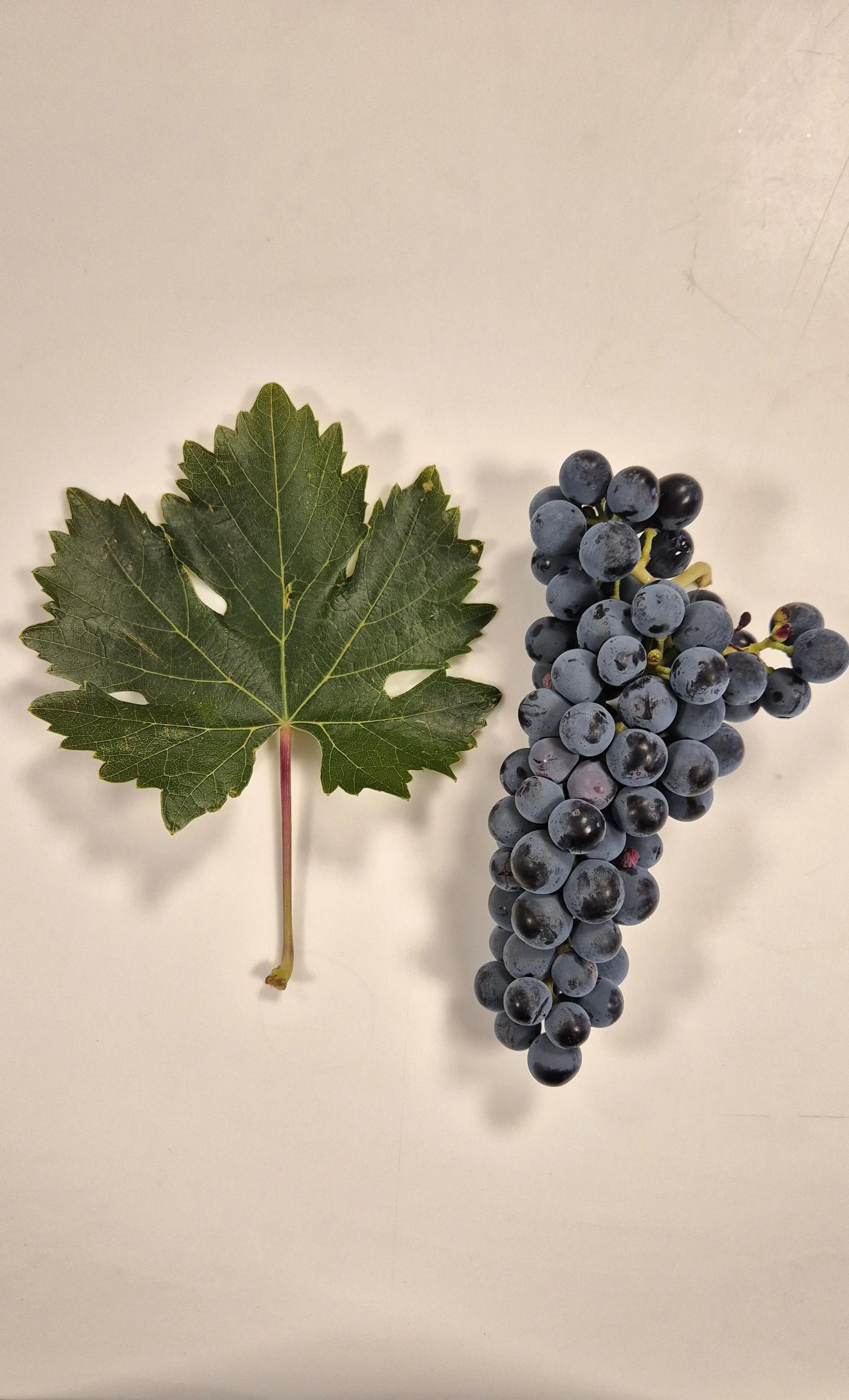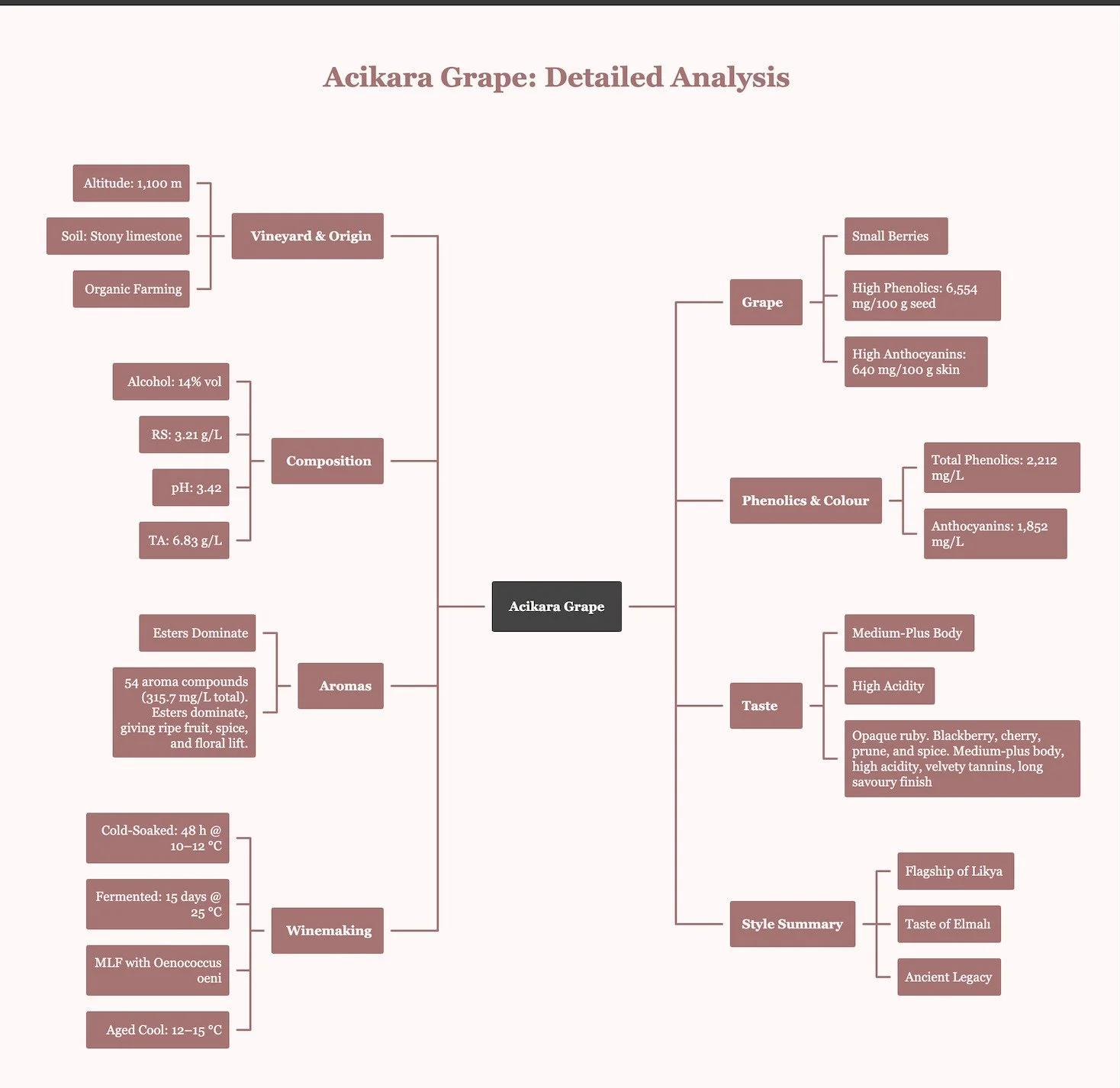Acıkara: Reawakening the Wine Soul of Ancient Lycia — A Forgotten Turkish Grape Returns
Drive inland from the turquoise coves of Antalya and you leave the beaches behind for pine forests, cherry orchards, and the scent of mountain air. Ninety minutes later, the road opens onto a wide, cool plateau ringed by 3,000-meter peaks. This is Elmalı, a hidden valley in southern Türkiye’s Taurus Mountains, 1,100 meters above the Mediterranean.
Here, in what archaeologists identify as ancient Wiyanawanda — “the land of wine” in 1500 B.C. Hittite texts — a lost Turkish grape variety has come back to life: Acıkara.
Elmalı: The Ancient Heart of Turkish Wine
Modern Elmalı lies at the core of ancient Lycia, a Greco-Roman province that once bridged Anatolia and the Aegean. Nearby ruins such as Oinoanda, literally “the place of wine,” tell us this was one of the earliest organized wine regions in Anatolia — a cradle of ancient Turkish winemaking.
Despite its Mediterranean latitude, Elmalı’s altitude brings a continental microclimate: warm sunny days, cold nights, and red-clay soils rich in limestone. The daily temperature swing — sometimes over 20 °C — helps preserve acidity and aromatic precision.
It’s a climate few expect in southern Türkiye, yet it’s this rare mix of heat, altitude, and rock that produces wines of striking freshness, purity, and balance. On these stony slopes, Likya Vineyards is redefining what the words Turkish wine region mean.
The Rediscovery of the Acıkara Grape
The story of the Acıkara grape began in 2002 when Burak Özkan, founder of Likya Vineyards, followed a shepherd’s story about a wild black vine known locally as Acı Kara — “bitter black.”
Just beyond the village, he found it: a lone wild Vitis vinifera, two centuries old, climbing a pine tree. It was the last living memory of an indigenous Turkish grape once native to the Lycian mountains.
Cuttings were grafted, cultivated, and studied for over ten years. When DNA analysis arrived, the results were remarkable — Acıkara was a unique native Turkish genotype, unrelated to any known local or international variety.
The first small bottling appeared in 2012. Today, Acıkara stands as the flagship wine of Likya’s Arkeo Collection, a project dedicated to reviving the extinct grape varieties of Lycia and southern Türkiye — nine of which are now genetically confirmed and under protection.
Science Meets Heritage: Acıkara’s Phenolic Power
At the 2024 OIV World Congress in France, researchers presented the first scientific profile of the Acıkara grape, revealing extraordinary richness in phenolic content — placing it among the most structurally powerful red wine grapes in Türkiye.
Key Data:
Skin phenolics: 1,332 mg/100 g DW
Seed phenolics: 6,554 mg/100 g DW
Total anthocyanins: 640 mg/100 g DW
Seed tannins: 52.9 mg/g DW
Fifteen anthocyanin compounds were identified — 13,600 mg/kg DW total, comparable to benchmark varieties such as Syrah and Tannat.
In finished wine, Acıkara shows 2,212 mg/L total phenolics and 1,852 mg/L anthocyanins, yielding a dense violet-black hue with exceptional colour stability. GC-MS analysis revealed 54 aroma molecules, dominated by esters of black fruit, violet, and warm spice.
For researchers, Acıkara was proof that Türkiye’s native grapes can compete with the world’s best — and that ancient Anatolia remains one of the deepest reservoirs of Vitis vinifera biodiversity on Earth.
High-Altitude Viticulture in the Taurus Mountains
Likya’s Acıkara vineyards rest on gentle slopes facing the Taurus ridge, where limestone and red clay create natural drainage. Farming is organic, reflecting the estate’s philosophy of “letting the mountain speak.”
Harvest occurs in early October, when the fruit reaches 23 °Brix (231 g/L reducing sugar), pH 3.4, and 5 g/L acidity.
Winemaking highlights:
Cold maceration for 48 hours at 10–12 °C
15-day fermentation at 25 °C with RX-60 yeast
Malolactic fermentation with Oenococcus oeni
Six months of neutral French oak ageing
The resulting Turkish red wine shows both structure and finesse — built on natural acidity rather than extraction.
Tasting Acıkara: A Wine of Power and Grace
In the glass, Acıkara 2024 is nearly black with violet edges. Aromas recall blackberry, mulberry, prune, and cedar, touched by wild herbs and graphite.
The palate is medium-plus in body, driven by bright acidity and fine, mountain-shaped tannins. It finishes long, savory, and mineral. Julia Harding MW described it as “a red that feels both ancient and modern, rooted and pure.”
That’s Acıkara’s charm — the balance of Mediterranean warmth and alpine freshness, a duality rarely found in Turkish red wines.
From Vineyard to Genome: Protecting Turkish Biodiversity
Nearly half of Likya’s 50 hectares are dedicated to grape research and micro-vinification. Each rediscovered variety is studied over a decade before it earns a place in the Arkeo Collection.
Swiss geneticist Dr. José Vouillamoz identified nine distinct indigenous genotypes in Likya’s experimental plots, confirming southern Anatolia as one of the world’s richest reservoirs of native Turkish grape varieties.
In a landscape where ancient amphorae still appear after rain, Likya’s work bridges archaeology and viticulture — turning ancient genetics into future wines.
Wiyanawanda Today: The Land of Wine Reborn
At sunset, the limestone ridges of Elmalı glow gold, and the cool mountain air fills with the scent of thyme. It’s easy to understand why the Hittites once called this valley “the land of wine.”
For Likya, each bottle of Acıkara is a cultural act — preserving Anatolian heritage through wine. The label reads like a story of rebirth: from a forgotten vine in the forest to a modern cuvée now poured in fine restaurants worldwide.
The Arkeo Collection, which includes Likya Ateşi (“Lycian Fire”) and Likya Işığı (“Lycian Light”), continues to revive Turkey’s ancient viticultural DNA — redefining the idea of Mediterranean mountain terroir.
Conclusion: The New Face of Turkish Wine
For sommeliers and enthusiasts exploring Turkish wines or studying indigenous grape varieties, Acıkara offers more than novelty. It is scientifically validated, organically farmed, and authentically Anatolian.
From Wiyanawanda to Elmalı, from wild vine to modern wine, Acıkara bridges the ancient and the contemporary — a living symbol of how Türkiye’s oldest grapes may shape its winemaking future.
Taste history reborn — in every glass of Acıkara.


